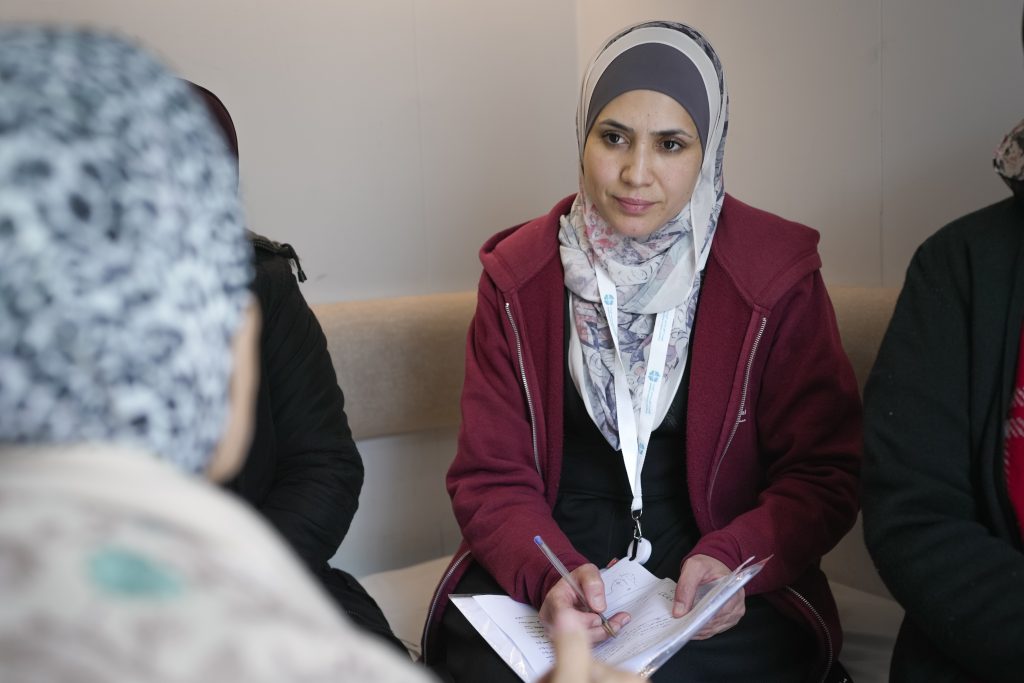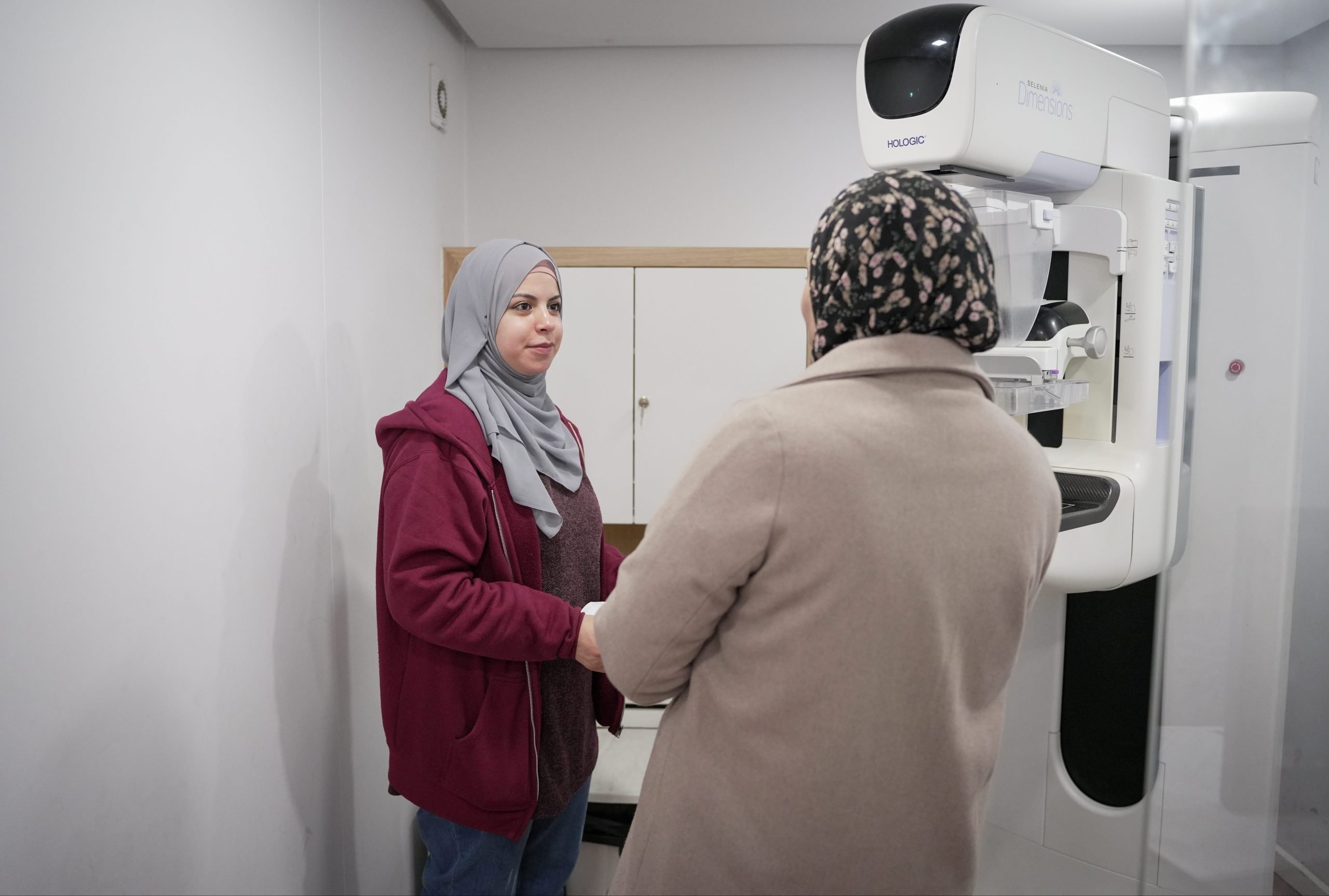V. was 50 years old when she underwent her first mammogram at the Augusta Victoria Hospital in Jerusalem, and the examination had found no abnormalities. Five years later, during a visit by the hospital's mobile clinic to the UNRWA Health Center at Aqabat Jaber camp in Jericho, V. underwent the checkup again, which revealed a suspicious mass in her left breast. Upon further examination, the results confirmed the presence of stage 2 cancer. Upon hearing the news, V. gathered her strength and decided to continue treatment, encouraged by the mobile clinic staff.
I accepted my case and tried to deal with it thinking that I could be cured. Six weeks after surgery, I started the treatment protocol, during which I underwent 8 sessions of chemotherapy and 15 sessions of radiation that help prevent cancer recurrence. I am grateful to the staff of Augusta Victoria Hospital: having detected my cancer at a still early stage saved my life. Therefore, today I encourage all women to undergo mammography examination to detect any abnormal masses early.
V., Palestinian woman involved in "Fight like a girl 2.0" project
The mobile clinic at Augusta Victoria Hospital that enabled V. to get treatment is supported by AVSI through the Fight like a girl 2.0: toward prevention and early diagnosis of breast cancer project funded by the Emilia-Romagna Region, and makes it possible to reach women and girls living in rural and marginalized areas of the West Bank, reducing the costs and difficulties associated with traveling to nearby health centers.

Breast cancer prevention and diagnosis in Palestine
In Palestine, breast cancer is the most prevalent type of cancer among women, with a general upward trend over the past decade. The average incidence rate of women's cancer cases in Palestine is 154 per 100 thousand women, accounting for about 2,500 new cancer cases diagnosed each year, of which more than 600 are breast cancer, partly due to the reduced capacity for diagnosis and prevention.
In addition, the cancer mortality rate is 90.2 percent, or 1,350 women a year, of whom nearly 400 die from breast cancer due to lack of early diagnosis and fewer treatment options.
Such a high mortality rate is due to the fact that in Palestine, most cases of breast cancer are identified at an already too advanced stage of the disease for two main reasons: the barriers women and girls face in accessing health services and socio-cultural factors.
Breast cancer screening, diagnosis, treatment and follow-up services are available in the different governorates of Palestine, but mostly in hospital facilities in the main cities. In addition, mammography machines and free screening services are poorly distributed among the different governorates in the West Bank or malfunctioning.
For this reason, women from the most rural and marginalized areas, such as Bedouin communities in Area C, face great difficulties in accessing these services. Added to this are the physical, structural and bureaucratic barriers imposed by Israel, which prevent easy access to hospitals. In addition, as a result of the Middle East war that broke out on October 7, 2023, the ability to travel to the West Bank is even more limited due to the presence of roadblocks, very long checks at military checkpoints, and the fear of being attacked by Israeli settlers.
From a sociocultural perspective, Palestinian women and girls are uninformed about the need for regular mammography checkups due to lower levels of education and lack of information about what a breast self-examination is and how to perform one. In addition, there is a widespread community-level perception of cancer as a social stigma, particularly for young girls.
The Fight like a girl 2.0 project: toward breast cancer prevention and early detection
The project "Fight like a girl 2.0: toward breast cancer prevention and early detection" started on September 14, 2023 and will end on December 22, 2024, thanks to funding from the Emilia-Romagna italian region. The initiative is in continuity with the first phase "Fight like a girl!" which ended on Feb. 22, 2024. to promote inclusive access to women's health, especially in the area of breast cancer prevention and early diagnosis, for women and girls in the Palestinian territories, rural areas in the West Bank and East Jerusalem through a public-private partnership network. AVSI is the lead organization for the project and collaborates with the Augusta Victoria Hospital in Jerusalem and the Italian partners: the Municipality of Forlì, Associazione Amici e Volontari dell’Istituto Oncologico Romagnolo, AUSL Romagna and Associazione Centro di Solidarietà of Forlì.
Thanks to Augusta Victoria Hospital's mobile clinic, the medical staff reaches out to marginalized communities in the West Bank to offer awareness sessions and the opportunity to undergo mammography screening for women and girls who, in case of suspicious masses, are referred to the hospital for more in-depth examinations. If they test positive, they are taken care of by the same totally free of charge.
The project will also provide training sessions targeting students and nursing school students at Bethlehem and Birzeit Universities to increase their knowledge and skills on breast cancer treatment.
So far, the intervention has directly involved more than 2,000 beneficiaries, including women and girls who participated in the awareness sessions and/or underwent breast self-examination or mammography, in addition to the 6,717 women already reached during the first phase of the project.

How to support the Augusta Victoria Hospital mobile clinic
The project includes initiatives to raise awareness on the issue of breast cancer prevention and early detection in Italy as well. These include the fundraising campaign "Prevention and Treatment: let's bridge the gap" to make the action of the hospital's mobile clinic even more effective with the installation of an ultrasound scanner.
The initiative was launched on February 22, 2024 by Associazione Amici e Volontari dell’Istituto Oncologico Romagnolo and will end on May 9, 2024.
Thanks to the ultrasound scanner, it will be possible to perform a more thorough examination in a single session for each woman visited, with multiple positive effects. First, the greater accuracy in diagnosis will reduce the number of uncertain cases of breast cancer, preventing the patient from being forced to undergo further in-depth examinations, and thus more expensive and difficult travel to the Jerusalem hospital. Secondly, this will ease the emotional burden on the patient and her family members for ascertaining cases. Finally, the installation of the ultrasound scanner and the consequent reduction of referrals to Augusta Victoria Hospital will go a long way toward easing the burden on the hospital, which covers the cost of travel and examinations of patients who require such assessments.




